#i like knowing a lot of facts and stories and characters in a world
Explore tagged Tumblr posts
Text
I don't know if I agree that escalation is important. Another series that did this well is the Redwall series by Brian Jacques. The first book written in the series had a protagonist, Matthias. A later book focused on his son, Mattimeo. The stakes in Mattimeo's book are, if we're quite honest, noticeably lower than in Matthias'. There are still stakes -- one of the villains kidnaps Mattimeo and a bunch of other children and another one threatens their home while they are away from it, but neither villain is as threatening as the main villain of Matthias' story, and both of their evil plots are fairly localized. If they both got away with it then far fewer people would be negatively affected than in the first book.
In fact, both villains are villains that Matthias, as the hero of the first book, would easily have been able to deal with if he had just happened to be in the right place at the right time, but he's not. Matthias' failing as a parent isn't that he is bad at it. It's that his greatest strengths are also his greatest weaknesses. He's a very kind character, and this results in him letting Mattimeo get away with far more than he should, and one instance of him choosing to be kind rather than cautious kicks off the plot and all the ensuing conflicts. (Note that this is not presented as the wrong choice, per se, just an example of how unfortunately bad people can often use people's good qualities against them.)
Matthias then spends the entire book being restrained from being involved directly in either plot (which, again, he would have sorted in about ten minutes most likely) by time, distance, or cave-ins. Getting thrown into a bottomless pit. That sort of thing. There's almost a third plot where Matthias struggles against himself, TBH. His actions only indirectly and distantly affect the downfall of either villain. (This is thematically appropriate for the character, something something themes and motifs, but only tangentially related to this discussion.)
Some of the things that make this sequel succeed where others fail are these:
Matthias is present and active in the story. He is not put on a bus or killed early on; lesser writers use this tactic when they fear the new characters won't hold their own against the old ones. He is present and active; the story is simply not about him. He also passively influences the story through his past actions from the first book (kind of) and who he is as a person.
Matthias is a good parent, albeit not a perfect one. This works to the story's advantage, as Mattimeo ends up sharing many of his good traits that endeared readers to him in the first place by virtue of having been raised by him. Now they endear readers to the new protagonist as well.
Matthias has his own proper role in the story and a satisfying character arc. Matthias enjoyers still have something to be excited about in the story even though he is not the protagonist: here the writer neatly sidestepped the pitfall of alienating readers who are primarily reading the sequel in the hopes of new stuff about their faves.
Stakes really have little to do with it -- if anything the story is helped by the fact that the stakes are all deeply personal to the protagonists and not an Even Bigger Threat that will Destroy the World Even Harder than the first time.
In the case of Tolkien also doing this well, I think the most important takeaway is this: The parent figure must in some clear and important way influence and direct the child figure's story. You cannot write a sequel about a beloved character's kid where things just happen just because. There must be a clear line of narrative that makes sense between the parent and child's story.
But it takes a really talented writer to pull that off (especially if they weren't planning the sequel when writing the first book) and well a lot of people aren't really talented writers.
Generational spin-off media is like “okay, what would be the most in-character way for the previous show’s protagonist to comprehensively fail as a parent?”
47K notes
·
View notes
Text
And no one in the world can see through you...

I think one of the most important and acute themes of the drama is the desire to be seen, to be real for someone. The desire is so greedy and desperate that many heroes are ready to die for it.


Because without this feeling of being seen and understood, they feel like they are in an endless dream. Not so real. And for the opportunity to become real, they are ready to pay with pain and life.
Ying Lei and Bai Jiu both died trying to do something meaningful for their special person. Striving to be the one who changes something - himself, alone. And maybe that's why they were so reckless.
Li Lun sacrificed his immortal existence to become a real man for one day - the man Zhao Yuanzhou will not forget.


The bird goddess understands that this Fei is not real - and understanding this, she kind of see the real Fei in her heart.

And therefore she feels it as if they are finally together.


This is a desperate, beautiful but painful desire to have someone who sees you and whom you see, someone who will illuminate the darkness of your loneliness, especially acute and painful for those who are used to feeling like an "anomaly".



The drama also raises the social aspect - about how anomalies are not accepted by society, are seen distortedly and falsely, and this experience of social invisibility makes the desire to find someone who will see and understand the real you even stronger - sometimes dangerous and even destructive.
All the characters are in some sense are dreamers in a dream and puppets in a play.
And in this play you can go beyond the given role, show a glimmer of your true self only at the moment when your role ends. And every hero here dies looking at the one for whom they wants to become real most of all.


This interestingly reflects the fact that under censorship, a lot can only be shown at the cost of the hero's death. Like queer couples in censored dramas, they usually die in the finale (at least one of them). Antiheroes who reject the laws of this world's also usually assert their right for sympathy with a selfless death.
But in reality, a person asserts themself and finds understanding not through death, but through life. It is not the final sacrifice, but the path traveled that matters.
And this is where I see the meaning of Zhao Yuanzhou's path.
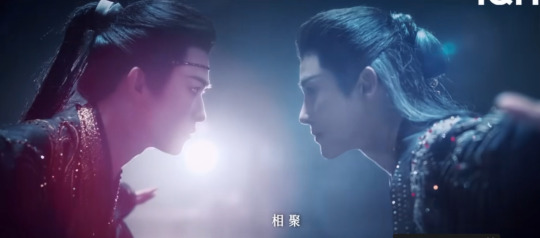
He could have died in the middle of the story - and the villain would not have received his power, and the world might not have needed to be saved.
But then ZYZ would have died unrecognized and misunderstood, lonely.
But thanks to the path traveled, he finds someone who sees him, who understands him, who loves him and makes him real.
And for Zhuo Yichen, this is no less important - for someone who was afraid of his dreams and therefore lived as if in a dream, for someone who was afraid of that unconscious part of himself. And therefore, diligently fulfilling his social role, he did not get close to anyone.
But the more alive and real they become together, the tighter the web of fate becomes. As if resisting their desire to be together.


And yet I would like to think that this desire and their mutual reality turns out to be stronger than the tragic scenario.
Like at the moment when Zhuo Yichen was supposed to die together with the villain, but did not die because the Zhao Yuanzhou's spell "recognized" him.
This desire to stretch the thread of connection through all obstacles, barriers and through death itself is very tangible in the way they're holding hands.


And this courage not to let go even when it seems the universe itself is separating you plays a key role in the finale.
"I recognize only the principles of my heart," says Li Lun.
And I like to think that along with his power, he passed on to Zhuo Yichen a part of his rebellious spirit and gave Yichen the courage to resist fate.
Yichen too manages to save part of Yuanzhou's soul because he knows that soul truly. They manage to pull this theme of mutual recognition into a situation as far away from an act of love as possible.

This "I knew you would do this" "and I knew you would do this, and that's why I do something else" and "you're still so..." - as both recognition of "it's you" and surprise and recognition anew.
They are both tied with ropes to their roles, like puppets of a demon who fulfills wishes. But they see each other beyond these roles. And with his final act, Zhuo Yichen seems to connect their destinies beyond the boundary where their roles end.

Zhao Yuanzhou had to fulfill his role as a sacred sacrifice and leave. Zhuo Yichen had to fulfill his role as an instrument on which Yuanzhou would make his sacrifice. But Yichen, taking on an active role in a situation of impossible choice, goes beyond the role of an instrument - and thanks to this, he can do what does not fit into this role.


Save Zhao Yuanzhou's life and connect their fates beyond the fulfillment of the prophecy.
And now they're both free.
75 notes
·
View notes
Text
My opinion about Arcane s2 (mostly Viktor)
I'm trying to be neutral on this, but I'm upset with what they did to Viktor.
I was wrong about their relationship with Sky (but I had hope), you can see he never really cared for her and the animators put their all into conveying that. Plus, let's say Sky represents Viktor's humanity and Viktor himself gives up on her. And it's a lot easier for him to give her up than it is for Jayce, who he's trying to show this new “world” to.
They have a lot of gay moments with Jayce, I don't know why the writers call it “family”. It's really hard to see family in that. It seems like at some point they decided to change the plot, because at the end Jayce and Viktor just disappear and no one just doesn't care what Jayce has with Mel.
The thing I didn't like the most was how they changed Ryze, that now Ryze is Viktor, the all-powerful mage. We know from the documentary that it was Ryze at one point. That would make more sense than Viktor traveling through time and constantly dooming himself to a series of miseries. But then again, they added the “all for Jayce” aspect to it.
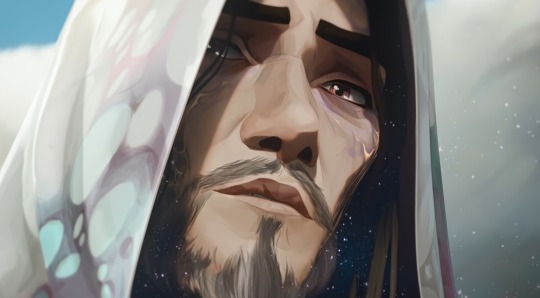
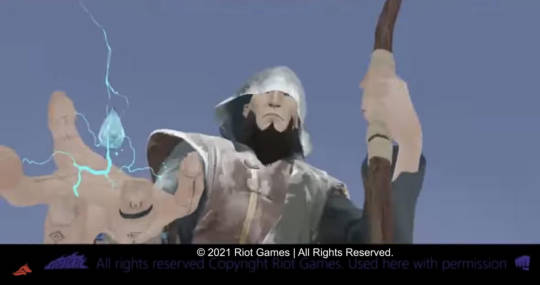
You can see it's supposed to be a different character, right?
I really didn't like how they treated Sky because obviously she wasn't an evil manipulative core. Viktor killed her twice for his own purposes. Once by accident, the second time on purpose. Look, you add a girl who is IN LOVE with a man, make her die twice for him, and show WHY he doesn't care. It's a dirty act. Amanda said she was “proud to write Sky”, I don't know what there is to be proud of. As a woman, it was painful for me to watch. You didn't have to do that. Did you mean to say the character is gay? You don't have to humiliate women to do that.
I always hoped Viktor wouldn't have any romantic innuendos because feelings, for Herald, are a weakness. But the fact that they're indulging JayVik fans makes it look NOTHING like that. Like, I'm not a fan of this ship, but even I don't consider what they showed as brotherly feelings. Especially from Viktor's side. He is literally too concerned with Jayce's opinion.
I also think that the writers largely emphasized the clips and fights, but didn't add to the story itself. I mean Silco's deep thoughts in the first season on political topics and the theme of family in general was shown much better.
Herald is essentially non-existent. It's a character for the last two episodes who is immediately killed off because of a few words from Jayce. Viktor returns and they vaporize somewhere. I take it this is starting a recurring time loop.
They kind of tried to put in Viktor's “here he's come to the realization on his own that humanity is bad”, but they did it SO FAST and literally because of one event that it looked bad. Yeah, it's not about hexcore. VIKTOR SUPPOSEDLY CAME TO THIS ON HIS OWN. Why? Because Jayce shot him, and then Jayce helped him realize otherwise. No, really, what was that?
I also didn't like the redesign. I was hoping the mask would look different, but it looks HORRIBLE.
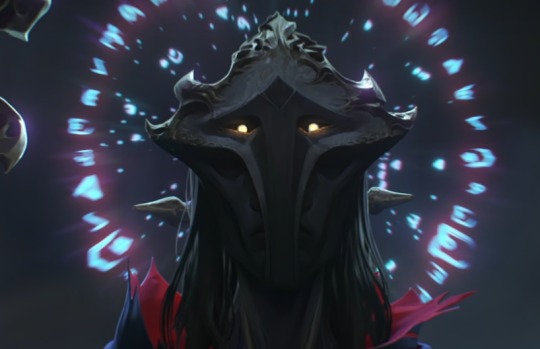
It's supposed to give the impression that Viktor “shut down and withdrew into himself”, they also tried to make him a “deity”, but since it only lasted 20 minutes before he went back to his normal state, it didn't make any sense… Anyway… I sympathize with everyone who loved Viktor specifically, outside jayvik ship (happy for you guys). I know they are excited, but this is not Viktor's story. You see, Viktor doesn't have his own personal story now, he's too connected to Jayce. You could say he did everything and nothing at the same time. Because he keeps running this time loop, but he's running it because of Jayce's influence.
Waiting for his updated lore to read….. idk I'll read it and forget it like a bad dream.
#viktor arcane#viktor#arcane#arcane spoilers#sky young#sky arcane#machine herald#animation is nice but not the story#I'll buy the artbook and that's it#I guess....#arcane s2
34 notes
·
View notes
Note
why do you think Deku never tried to talk to Shigaraki? doylist reason is obvious but what's the watsonian reason?
Honestly, this one’s pretty tricky to answer. It’s very hard to get myself into the headspace of Deku (and the people in his own headspace!)—mainly because I get extremely uncharitable, extremely quickly. Mainly about Horikoshi, yes, but that does extend to Deku, too, as well as the broader world he lives in.
The brain goes immediately to answers like, “His world is so incredibly slanted towards retributive models of justice that the fact that he even thinks about wanting to know Shigaraki’s motivations makes him a candidate for mad sainthood to the people around him. The fact that he doesn’t follow that impulse through all the way to actually asking is immaterial; while Villains have to be punished for their actions, for Heroes, it’s the thought that counts.”
See how I’m already drifting back towards meta-narrative analysis at the end there? Deku brings a lot of that out in me, especially from Villain Hunt onwards. Like the wooden doll he’s named for, he comes off to me as a vessel for the plot to happen through more than he does a consistently written, well-thought-out character. Trying to think of him through a purely Watsonian lens—no refences made at all, period, to what I think the story was trying to express or what Horikoshi’s intentions towards that story were—I almost immediately jump the tracks into territory that is all but certainly incompatible with what I was “supposed” to take away from MHA as a story.
But, you did ask, so I’ll follow the thought experiment through. If I were to try and set down to paper an explanation for Deku’s actions from a purely in-universe stance—say, for writing canon compliant post-series fanfic—what would be my explanation?
(Hit the jump.)
Right off the bat, from a cultural perspective, I think Deku is afraid that if he tries to make excuses for Shigaraki, it would be disrespectful to Shigaraki’s victims. That’s why you get the heroic characters constant harping on about how they can’t forgive the Villains, even though, as adjuncts to the police, “forgiveness” is utterly immaterial to them doing their jobs. Too much sympathy for criminals, in some peoples’ eyes, becomes indicative of a lack of proper regard for the victims of crime; this is very much a dynamic in play in Japan’s legal system.[1] Ochaco initially has the same impulse, where she’s terrified that even thinking about Toga Himiko’s human circumstances puts her in danger of forgetting the suffering Toga and the League brought about.
1: That’s a meta consideration, yes, but one that I think the target audience would understand to be implicit in the canon as written, so I’m treating it as a Watsonian detail.
Ochaco and Deku commiserate and ultimately encourage each other to embrace their desire to understand their respective Villains, which leads to Ochaco talking to Toga at some length! Ochaco must do this because asking Toga these questions if the only way she has to reach that understanding. Deku does not have to ask, however, because he has a cheatmode to fall back on: the mindscape shared between All For One and One For All. If Deku thinks too much open communication with Villains risks dishonoring Shigaraki’s victims, well, he doesn’t have to openly communicate. He doesn’t have to talk to Shigaraki the person at all. He just has to find that crying little boy in the mindscape again.
I also think it’s notable that Deku very much does stop talking about wanting to save Shigaraki after he talks to Gran Torino. From that point on, everything he says about Shigaraki becomes about wanting to understand him instead. Coupled with the idea that he insists upon not forgiving Shigaraki, I get the sense that what Deku wants is not to help Shigaraki at all, but rather to simply bear witness to his truth. And even that much feels self-serving to me—as if Deku doesn’t care so much that Shigaraki is in pain, but rather that Shigaraki might have a point, that Shigaraki’s pain might be valid. Shigaraki having a valid point would destabilize everything Deku believes about Heroes and Hero Society, and Deku has, by that point, seen enough that he’s too upright to look away, to “sweep things back under the rug,” so he has to find out Shigaraki’s story to judge it for himself.
The fact that he feels he has the right to judge Shigaraki’s story speaks to the arrogance of Heroes—the same arrogance that leads them to declare their lack of forgiveness as if it’s in some way relevant to doing the job in front of them—as well as a deeply rooted defensiveness: that they must have, and be perceived as having, the moral high ground over those evil Villains. I think, for example, of the Flamin’ Sidekickers and their cringingly awkward self-justifications to Dabi about their continued association with Todoroki Enji. Their reasoning has zero bearing on either Dabi’s pain or their own heroic responsibilities to assist in the arrest of a known murderer/terrorist/arsonist, but they feel the need to spell that reasoning out to the child abuse victim/volatile Villain anyway, seemingly for no in-character reason save to rationalize the deep discomfort that Dabi’s video accusations provoked in them.
Heroes must be seen as morally just—this is the whole basis for the authority they’ve been granted to wield their powers against other people. Best Jeanist talks about this idea explicitly, as does Police Chief Tsuragamae. Far more damningly, it’s what led to the HPSC using agents like Lady Nagant and Hawks to quietly dispose of anyone that would present a threat to the public image of Heroes and, by extension, the fragile peace that rests on that public image.
Heroes must be pure and righteous, and Deku is just as apt to believe that as any other Hero—maybe even more apt, given that he’s also had All Might leaning on him about the bearer of One For All being the Pillar and the Symbol of Peace. All this baggage winds up conflicting, however, with the horror and reflexive need to help Deku feels upon seeing the small, crying child within Shigaraki.
Saving small crying children is the absolute, innermost core of Deku’s personal framing of Heroism—seriously, he says this nearly word-for-word in Chapter 1!—and so, like Shouji says of the heteromorph riot, it isn’t something he can ignore and still call himself a Hero. He’s unprepared for that personal brand of Heroism to conflict with the demands of professional Heroism, because he never expected to face someone who was both Evil Villain and Crying Child at the same time. This is what he wrestles with over the course of his time away from UA and why, ultimately, he decides to use the mindscape as a way of resolving the conflict.
(Note again that I'm talking about my fanfic explanation here. Deku's reasoning is much murkier in the canon because of the canon's late turn towards locking us hard out of Deku's personal feelings and thoughts when they're about anything more complex than chain OFA combo moves.)
Remember that Deku begins the Villain Hunt Arc with a tentative desire to “understand Villains” so that he can perhaps use that understanding to avert or at least deescalate conflicts with them—and then the very first Villain he falteringly tries to understand is fucking Muscular, who shuts him down cold. Deku never tries that hard[2] to understand a Villain again—Lady Nagant dumps her backstory on him with very little prompting from him, he has nothing but ultimatums for Overhaul, he doesn’t seem to ask any of AFO’s other minions any personal questions whatsoever, and with Shigaraki, he goes straight to the mindscape instead of even attempting a dialogue.
2: Insomuch as you could call asking three invasive, judgy questions in the middle of combat and then throwing in the towel “trying hard”.
My take is that Muscular scared him off of trying to verbally uncover the backstories of Villains—even though Shigaraki is ready to all but hand the first Hero to ask an illustrated history of his grievances with Hero Society, Deku can’t trust that anything Shigaraki tells him will be the unvarnished truth. Unlike Shouto, he has no one to corroborate the truth with, but unlike Uraraka, he doesn’t just have to make the best of it, either. He can instead utilize the mindscape, an approach that sidesteps all of the issues that a spoken dialogue would entail:
Getting Shigaraki’s truth via the mindscape means he can trust the answers he gets, rather than having to filter those answers through Shigaraki’s warped worldview. This allows him to honestly evaluate Shigaraki’s perspective, gauging whether Shigaraki has a real point that Deku has any responsibility to address, some injustice that needs to be corrected independently of Shigaraki being held accountable for his crimes.
Having decided that—for reasons of justice, All Might’s Pillar mentality, and his own peace of mind—he has to know Shigaraki’s truth, Deku comes to feel self-righteously entitled to that truth. Thus, even though Shigaraki always seemed perfectly willing to share his thoughts in their previous encounters, Deku can’t take the chance that he’ll change his mind and rebuff Deku like Muscular did. Using the mindscape takes that agency away from Shigaraki, rendering his willingness to share moot.
No one other than people with access to the shared mindscape can perceive the interactions happening within it. This means that, no matter what Deku learns or how he reacts to it in the moment, he doesn’t risk being seen as disrespecting Shigaraki’s victims by prioritizing the feelings and perspective of a vicious terrorist.
Finally, on a tactical note, the encounter Deku has with Shigaraki in the mindscape during the Jakku battle seems to happen nigh instantaneously. If he can get his answers at the speed of thought, that means he doesn’t have to specifically draw out his battle with Shigaraki until he’s resolved things to his personal satisfaction. This is ideal, since Shigaraki presents an incredibly dangerous threat to everything and everyone around him, and Deku’s Hero education has repeatedly emphasized the importance of ending battles quickly.
There's just one problem with all this: Deku is assuming access to Shigaraki’s mind. And why wouldn’t he? He got in there without even trying last time, after all! I assume that’s also why he rolls up to the battle with zero plans of any kind: he doesn’t understand how the mechanics of the shared mindscape work and none of the prior bearers can advise him because it’s a brand-new phenomenon for him as the ninth bearer, so they’re just as clueless about it as he is.
Lacking that knowledge, he opts to simply take it on faith that he’ll be able to access that mental space again, find the crying child in it, and uncover enough about Shigaraki’s history to render his own judgement of it. He's the Deku who does his best, after all; if it doesn't work, at least he'll know he tried. The good faith attempt, however it turns out, will allow him to satisfy his own sense of justice while not interfering with whatever temporal justice the adult Heroes are planning for Shigaraki—to which Deku fully believes he must be subjected as punishment for his crimes!—be it arrest or an execution broadcast to the entire world.
Unfortunately for Deku, thanks to his being waylaid by Toga, he turns up late to the battle only to find Shigaraki’s psyche sealed up tighter than an All Might-themed wall safe. Then, since he never had any kind of plan for talking to Shigaraki, and his own ability to plan things is strictly limited to combining quirk abilities on the fly, he has to wing it until Kudou is able to come up with a plan for him. Naturally, because Kudou is Kudou, and Heroes’ solutions are tailored to Heroes’ strengths, this involves violent psychic assault. And why not? It’s not like Deku believes Shigaraki deserves the mercy of a gentler approach. Just think of all those people he hurt!
Now, is this all heckin’ uncharitable? Does it paint Deku as well-intended but blindly self-righteous and ethically timid? Oh, for sure. And I do think there was a point at which Deku wanted to save Shigaraki in a truer sense—indeed, he’s quite plain-spoken about it in the OFA Mental Conference in the aftermath of the first war! However, it’s absolutely within his established characterization to run into things that make him uneasy and take the first out an authority figure offers him that spares him the work of demolishing and rebuilding his entire world view. Look no further than the aftermath of the mall scene. You can draw a straight line from Deku taking Tsukauchi's out (that Shigaraki is just a sore loser) to him also taking Gran's (that killing Shigaraki could be a way of saving him).
That’s the mentality I would lean on to explain Deku’s anemic efforts to truly save Shigaraki in the end: an inherent desire to help people that has been hamstrung by a learned dehumanization of Villains, a repeated emphasis on swift, unthinking action as a Heroic virtue, a culture that regards sympathy for those involved in a crime as a zero sum game, and, last but not least, a psychological complex about the basic nature of Heroism rooted in his fraught childhood.
Deku says he’ll “never forget” Shigaraki. If it were me writing the sequel, “never forgetting” would look an awful lot like, “Following a particularly frustrating day of the Pro Hero grind, Midoriya Izuku opens his eyes at 4AM one cold winter night in his early-40s with the horrible, inescapable realization that what he did as a teenager to a deeply victimized young man barely older than he was himself back then was fucked up in ways he can never repair or take back. And further that now, not only is he going to have to spend the rest of his life trying to make up for that act, it’s going to be much, much harder than it would have been back then, specifically because he did what he did back then and let the world get away with calling it heroism.”
Thanks for the ask, anon! I hope you find the answer interesting and at least somewhat believable, for all that it certainly isn't tonally in-line with the story's portrayal of its much-lauded protagonist.
(P.S. On top of convincing both All Might and Deku to not pursue saving Shigaraki in any concrete sense, Gran Torino also takes partial credit for Nana's decision to abandon Kotarou. Torino Sorahiko might actually be the all-time world champion of convincing OFA bearers that preserving One For All is worth abandoning children to their grim fates. Give him a hand, everyone. What a great and admirable Hero who absolutely deserved to survive all the way to the end of the story and who definitely is not a symbol of all the most jaded and cynical priorities of the old order.)
#bnha#green no. 2#bnha gran torino#quirk metaphysics#bnha endgame#stillness answers#stillness has salt
34 notes
·
View notes
Text

I hate the fact that my brain put out a plot idea for a Veilguard longfic. (Obviously centering around Lucanis and Spite.)
Ironically it is based on the kinda conflict within the fandom/meta that results from how "clean" and "heroic" the Crows come across in comparison to past depictions of them. I mean, I said it myself: In Veilguard they feel a lot like Assassin's Creed. Like: "Sure, we are assassins and we kill for a living, but we only kill the really bad people! Pinky swear!" While in older material they were definitely also killing good people and also very much participating in human trafficking (especially of kids that would then get trained to be assassins).
I mean, heck, from Lucanis' stuff in The Wigmaker Job (the short story) we also know that he and Illario were abused by Caterina. He very much rationalized it as "But she only did it so we could survive", but it was still abuse.
However, something we definitely know also from that same short story about Lucanis is, that indeed, he does have somewhat higher moral standards than your average assassin. And we know that he specialized on killing mages.
Now, from what I now understand about the worldbuilding is the following: In most of the cultures outside of Tevinter, mages are not only very much controlled, but also met with a lot of distrust. Making it quite likely that a lot of mages who have a lot of political influence are Tevinter mages, which will probably also mean that most mages he ever got hired to kill were from Tevinter, and he killed probably a percentually higher amount of Venatori than the average Crow. (Correct me, if I am wrong in this regard, DA-nerds. This is how I am starting to understand the world.)
However, if you consider the end of his companion quest... (more under break, because spoilers.)
He becomes First Talon, which means that he will have to deal a lot more with Crow politics and what kind of contracts the Crows at large will take.
Here is the thing: Everyone is the hero of their own story. And given all we know, I have a good feeling of the general narratives that Lucanis lives by. He is the good guy, because he mainly kills the really bad mages, because he protects Treviso, and really, those that end up dead had it coming.
But again, in past stuff we absolutely know that the Crows took down good people, before they were paid for it.
My first reaction to the end of the game was: "Oh, I can make them worse, hehehe."

And I mainly just would like to explore with Lucanis having to deal with the... uhm... business model of a professional groups of assassins being pretty much: "We gonna kill anyone we get paid to kill."
And I generally like the idea of a character having to adjust their personal narratives bit by bit, because it is one of the hardest things for humans to do.
But also... I have a long list of longfics I wanna write - and I would need to do so much research.
#dragon age the veilguard#dragon age veilguard#dragon age 4#dragon age#da:tv#da:tv spoilers#fanfic ideas#lucanis dellamorte#antivan crows
25 notes
·
View notes
Text
Discussion about romances + expectations under the cut (I'd put it as like..mildly critical, but also coming from a place of understanding?). As usual, will tag as such so you don't have to engage/read on if you don't wish to. I always invite open discussion, just keep it respectful (as I will endeavour to do so myself).
This is going to be a bit of a ramble, so I apologize if my thoughts are not clearly laid out like they should be.
I think I've found the reason why I (and maybe others), feel that the romances in Veilguard feel a bit... idk, hollow, at times (not BAD!!! just feeling like there could be MORE). And that's because of the trap of expectations. I may also be speaking completely for myself here.
Anyway, let's rewind to 2014.
Be me, 10 years ago. You're not really a gamer, but indulge in action RPG's casually.
See a commercial for this hot new game coming out called Dragon Age: Inquisition. Be intrigued by the character designs, but know nothing about the world. Come to find out it's part of a trilogy. So naturally, you buy the first two games and play through them before playing the third.
Be amazed, and completely hooked on the characters, the lore, the world, the darker elements and themes. It becomes your favourite game series of all time.
But you had no idea that you could romance any of the companions going into the experience. And man, does it fundamentally rewire your brain chemistry to fall in love with cRPG and get ridiculously attached to your Warden/Hawke/Inquisitor.
So, you romance Alistair first because he's funny as hell, and has a really interesting story/character arc. Then you romance Zevran, and love that too - he's charming and suave and awkward and funny. Then you go onto DA2 and romance Fenris and Anders, and each of those romances pack their own emotional gut punches. Then it's finally time for DAI, and predictably, you go for Solas (a veritable slow burn that spans TWO games), Cullen, and partially (I never finished those playthroughs lol) Blackwall and Dorian.
I had no idea you could romance companions going into these games. It was a pleasant surprise! It always felt like an important part of the story, while not overshadowing the main plot. There was enough material in the codexes, the cutscenes, and party banter to make each romance feel complete and whole and awesome and nuanced.
And then, like some of you I suspect, I read an article that touted Veilguard as "The Most Romantic Bioware Game Yet", and I thought - "Wow, if they're saying this then the romances must be something else", given the quality of the previous romances you've experienced in these games!
But you get to the game - and while you're having fun, it definitely leans more into the ARPG style where romances feel a bit more pushed to the side in order to tell a certain story than the traditional Bioware/Larian RPG experience you've come to love.
Which is fine! Again, once I stopped thinking of Veilguard as a classic Bioware CRPG, and more like GOW/The Witcher, I found I was able to appreciate it a lot more for what it is. Things have to Happen A Certain Way for the narrative to work, and that's not a bad thing. DA2 was similar - it was a harrowing, personal tragedy about the Hawke family and their struggle to survive in Kirkwall.
Just like DA2, there are aspects of Veilguard that make me glad things happened the way they did. I'm not mad that Rook has so much dialogue without a ton of player input and you can't 'be evil' - because the game doesn't make sense if you can. At its core, Veilguard's narrative is centered around Regret, after all - you can't have an evil protagonist running around because Solas' Regret prison would never work (evil people don't generally tend to regret their actions...)!
Now, if you're expecting a long-winded, fully researched academic breakdown of every romance I'm sorry but that ain't happening tonight lol. This is not based in any fact, this is all opinion.
I can't quite put my finger on it, but sometimes it feels like the romances in this game (and I say this with the biggest grain of salt as I've only done Emmrich and Lucanis' - and am going through Neve's now), are just missing....something, to take them from good to great.
I loved Emmrich's romance. I thought it was very well done. I think a lot of people would agree it's one of the stronger ones in the game - doubly so if you play as a Mourn Watch Rook (you get a TON of MW specific lines going this route, it's great). His side romance with Strife if you don't get together is very cute, I enjoyed it. But as superbly well done as it was, somehow, I wouldn't even put it in my top 4 Bioware romances.
With Lucanis' romance - whatever my hangups may be about how it was handled, certain parts of his romance were done excellently (even better than some of the previous Bioware romances, I'd say). You can read more about my thoughts on his romance here which is why I'm not going into detail about it. Unlike Emmrich's, I would put it in my top 4 because I fell in love with the character that much (both in the game but really, I've loved him since Tevinter Nights), and I've grown very attached to my first Rook and him as a pairing. I've seen others share a similar sentiment on here (and I hate to say it but I agree) - sometimes it feels like I fell in love with Rookanis despite the way it was handled, not because of it. I can't say that for many other romances. While it's been fun to think up a lot of HC/write fics/make art about those abandoned concept sketches and parts where I felt the game could have showed us more of their dynamic, I can't help but feel like his (and other) romances would have immensely benefited from even 1 or 2 extra small scenes to flesh it out a bit more if they weren't going to let us freely talk to our companions.
The issue with the romances might also have something to do with the pacing of the game itself. I think Act 2 is where the pacing goes a bit awry, before picking back up in Act 3 (which is great, I love it).
Sometimes I also felt that there was a little too much reliance on codex entries and party banter to tell the story of the romance rather than showing it explicitly through cutscenes. I think that's what makes the romances feel a bit truncated at times, compared to the previous entries? Some of the romance-specific party banter was so good, it probably deserved its own cutscene. But it's also highly dependent on the party you have, and it's easy to miss/not trigger. I remember absolutely living for the cutscenes in the first three entries and I can't explain why I feel like, subjectively speaking, Veilguard just has less romance content (this may not be objective reality - I haven't compared the amount of romance specific content head to head with other games).
I also couldn't tell you why I feel DA2 doesn't suffer the same problems as DATV in terms of romance interaction - because you can't freely talk to your companions in that game either. Yet somehow, it always felt like I was getting enough of them to not notice that. I do miss being able to chat my LI's ear off and ask them questions about their life/their views/etc. like I could in DAO and DAI. I think it's a shame we can't because the companions in DATV are SO interesting. I want to ask them all a billion questions about their lives/stories/etc even if they're not my love interest. The party banter in this game is immaculate but being able to talk to them individually about this stuff would've been SO nice. I feel that I've missed out on SO MUCH of these characters just because I didn't have two of them in my party at the same time!
Anyway, I need to wrap this up.
In closing, perhaps, if I hadn't read that article about how it was going to be Bioware's most romantic game ... maybe I wouldn't feel this way? I think it sent my expectations through the stratosphere, and that's no one's fault but my own. Not Bioware, not EA, mine.
I know that this game's development cycle was a unique sort of hell that the other games didn't suffer. To go from Joplin -> Morrison -> Veilguard. To have so many of the original staff leave the team when Joplin got scrapped. To have to pivot from Live Service and then back to single person RPG. More lay-offs. It's a miracle this game got made. I'm happy I can sit around thinking about it. And I hope its successful enough that we get DA5 so we can all sit around dissecting that in 5-10 yrs time.
Don't get me wrong - I enjoy the Veilguard romances for what they are. I'm enjoying them more I play and discover additional banter/codex/etc that I missed the first time around. Like any Bioware romance, there are spots where they hit their stride, and spots where they falter a bit. When they hit their stride they knock it out of the fucking park. But when they falter, you can really feel it. Romance is hard to write! And you'll never fully please everyone.
But a small part of me wishes I'd gone in blind, and checked my own expectations a bit.
Maybe you agree, maybe you don't. Tell me about it. What was your experience with the romances? Did you also read that article and get your expectations up?
I hope this makes sense.
Kind regards good fandom folks,
Keep the discussion respectful. And please don't use this post as an excuse to just blatantly hate on the game.
-Rookie
#datv critical#bioware critical#datv#lucanis dellamorte#neve gallus#emmrich volkarin#rook#as always i'd love to know your opinions#if you feel the same#if you feel differently#if differently#just keep it respectful#rookie rambles#datv spoilers
39 notes
·
View notes
Note
Genuine question, as someone who has characters of my own: how do I get over my embarrassment for having OC’s? I’d never make fun of someone for having them, but whenever it comes across my dash (especially if it’s ship art) I can’t help but… (for lack of a better word), cringe. I love people being creative but it feels like I can’t get over the backlash against things like that.
It's something you have to unlearn, and that's not always easy. I think as a whole, most fandoms are not OC friendly unless it's something like a videogame in which you create the main character from scratch. Most people will stick to already established characters, because that's easy to write. Very few are brave enough to make their own story.
Firstly, l'm going to discuss comics, this is a world of many worlds. DC as example has so many universes, and there's no way I could name them all. I think many of them are numbered, and fans who create their own usually make a numbered or named verse. Like, Codotverse! (if Codot can put his whole voice out there, you can do it too, btw)
Personally, I think the open ended-ness of comic worlds is a positive for fandom. It makes it so anyone can tell a story and despite it being fannon, it's really no less canon than what's in between the pages. Comic writers themselves can't get things straight half the time, heck I've been known to nit pick comics because they forget some fact about Jonathan that SHOULD be well known.
Now, lets talk OCs. The fact is, and this probably sounds mean, people would rather read about Scarecrow or Riddler then -insert Hench character for shipping here-
The reason is as stated above, it's easier to get into. They know what to expect. And unless this OC is someone you've been talking about for years and they have curated their own mini fandom within the fandom, most ARE gonna scroll by. That's sad, I know.
BUT that doesn't mean you should quit or be embarrassed about an OC. People can come to love them, but this usually takes effort and dedication on your part. You are the one and only author and content creator of this OC. Nobody else is gonna make content for them without insensitive. That means you gotta talk talk talk, and draw draw draw, then write write write. MAKE them care. People can very easily come to love and OC,. and i know this for a fact because I used to have my own and I always got asks, people wanted to draw them, or write stories, etc.
The thing is, you gotta embrace being potentiality embarrassing. If you don't take a step forward and put yourself out there, who will? This sounds very internal for you, and it's literally something that is taught to the youngins of fandom very quickly. Fandom, as a whole (think big here) will squash or despise anything that isn't palatable. And what is palatable? that changes often. Usually, fandom is a progressive space but that doesn't mean each and every sect doesn't have issues. Big issues that are spread between a lot of fandoms include misogyny and fetishization. This is why you sometimes see creators and fandom goers attacking canon female love interests and OCs. This is also why you see a huge influx of men being shipped together and any mention of either man loving or having a relationship with a woman is often erased. These two things go hand in hand quiiiite a lot actually. Just, a thing to watch out for and think critically about.
In the end, it boils down to making your audience care amongst a sea of easy to read and already palatable content. You gotta swim against the current. Make a space for yourself, provide something that doesn't exist yet. (for me, it was hi res comic scans)
Basically, don't let the haters win.
24 notes
·
View notes
Note
hey, i know you’re na’vi link so i wanted to ask something. i’m questioning na’vi kin right now but can’t talk about it on my main blog because one of my friends follows me. they know about my alterhumanity and i post about it on that blog. however, i am white. very white. i’ve seen some people say that na’vi kin is cultural appropriation? i’m worried my alterhuman friends will try to accuse me of cultural appropriation if i confirm this kintype. any advice?
Okay, well, first off, I'm also white, so let's get that out of the way. However I have had this conversation with and have heard the opinions of Native American people with both opinions, so I can pass on my conclusions from that conversation, and if other people have opinions they want to add I welcome them to, especially Indigenous folks of course.
Thing number one: if it's not a choice, it can't be morally wrong. End of. You can't apply morality to things that aren't choices. You can engage with it in moral vs immoral ways, but simply having an identity that you didn't choose cannot be immoral.
Now obviously that doesn't apply to me, and it may or may not apply to you, so here's the rest of it:
Someone who's Na'vikin/link isn't claiming to be Indigenous here and now. We're not claiming to have direct experience with those struggles or the same amount of voice as Indigenous people do with regards to them. Na'vi are similar to and based on Indigenous people, but they aren't actually Indigenous people.
The Na'vi aren't based on any one Indigenous culture - although the Metkayina are much more heavily based on the Maori than anything else, the other clans we've seen aren't as specific, and are intentionally a mish-mash of dozens of Indigenous cultures. So... who is allowed to be Na'vikin/link, exactly? If the answer is "only people from the culture they're based on," then the real answer is no one. And about that:
This is really just a variant on the old "is kinning outside your race problematic" argument, and we came to a community-agreed-upon conclusion on that years ago: no. For a lot of reasons, including the above, and also the fact that if you're saying it's okay to identify as a wolf but not as a character of a different ethnicity than you... does that not imply that it's easier for a white person to connect that deeply with an animal than with a person of color? Is that not pretty damn problematic itself?
As a bonus round, if your answer then becomes "well, I guess you can be Na'vikin/link, but you shouldn't talk about it/engage with it in public": we know that suppressing kintypes is bad for you. We have learned this the hard way - how many stories are out there about how incredibly unhealthy that is for most people? You're now advocating for a known harm in order to avoid a hypothetical one. I don't think that's fair to anyone.
For what it's worth, I do think there are probably ways to engage with being a Na'vi that are appropriative, racist, and weird toward Indigenous people - just like there are plenty of ways to be a fan of the Na'vi that are appropriative, racist, and weird toward Indigenous people. But I don't think being a Na'vi is inherently that way. I don't think it's that hard to be Na'vi and be respectful of real-world Indigenous cultures that the Na'vi have parallels to. As long as you're not claiming to be Indigenous here and now, or have some ~special connection~ to Indigenous cultures because of your Na'vi 'type, or appropriating Indigenous things because they have Na'vi vibes, then I think you're fine.
But, as I said, I'm more than willing to hear other opinions if people have them! Please, add on in the notes. (I also feel like I'm forgetting a major point in my argument as to why it's fine for some reason, but can't get my hands around it, so hopefully I'm wrong and if not you might see an update to this post in the future when I remember. I've got a bit of a headache right now, so I'm a little bleary.)
#navikin#navilink#otherkin#otherlink#copinglink#alterhuman#apostrophes break tags sorry </3#rani talks#asked and answered#anonymous
21 notes
·
View notes
Text
Sorry I have skipped answering anonymous messages for a while 🫣
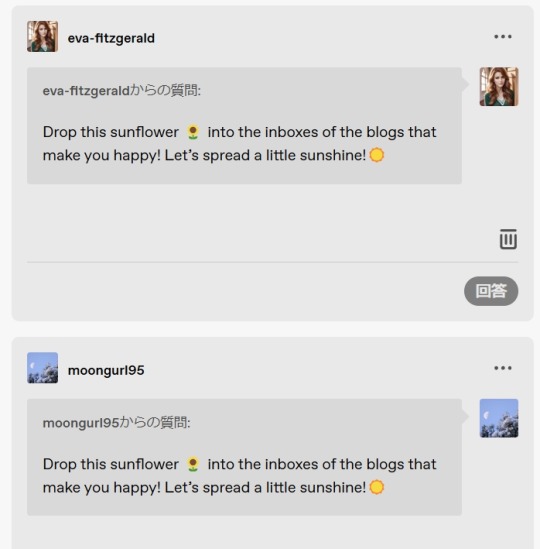
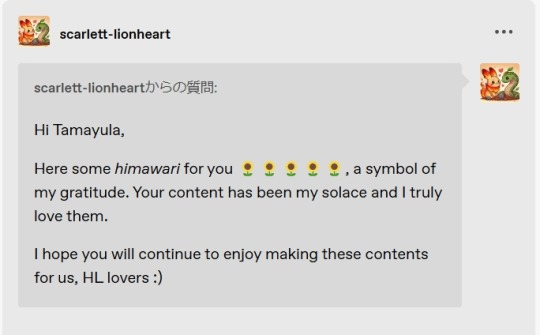
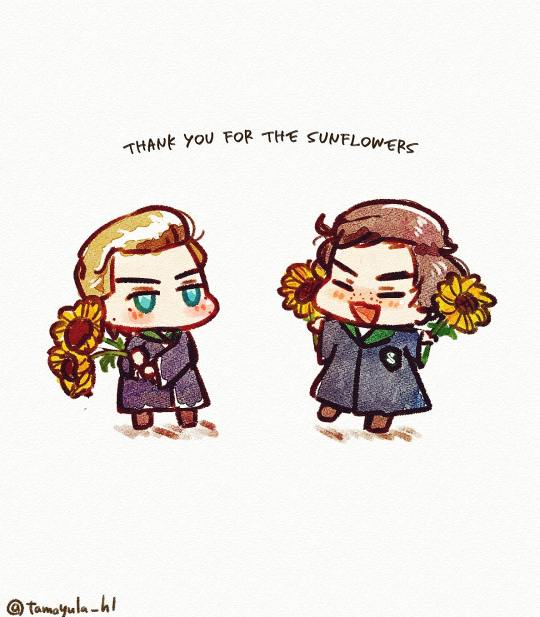
Thank you so much for all the wonderful sunflowers(Himawari)! 😭😭���✨🌻💕 (And sorry I'm always getting them and not spreading this joy to other people's inboxes 🙇♀️) I'll continue to have fun creating various Slytherins content 💪😌💕.
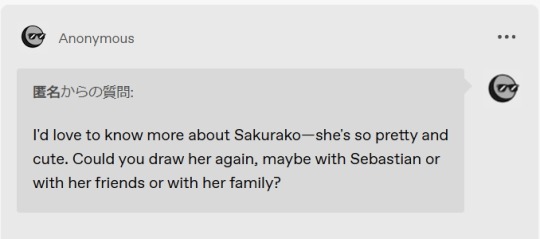
YESSSS! I want to draw more about Sakurako and I always want to draw something like an introduction sheet about the Seb x Sakurako ship, but there are so many other things I want to draw that those inevitably take a back seat 🤣. But I hope to draw Sakurako soon 💪.
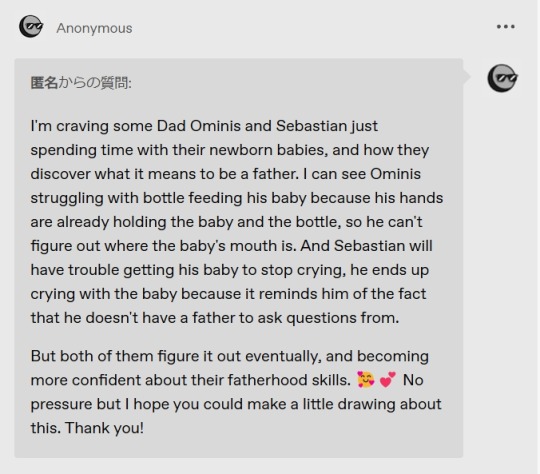
Aww, that's a very great idea! I'd love to see Slytherins struggling with parenting for the first time so I'd love to draw about this one day 😭✨. I can just see Ominis looking troubled and flustered while holding the baby, and Seb at a loss after trying to look things up in a book that he doesn't understand and can't solve… 😏.
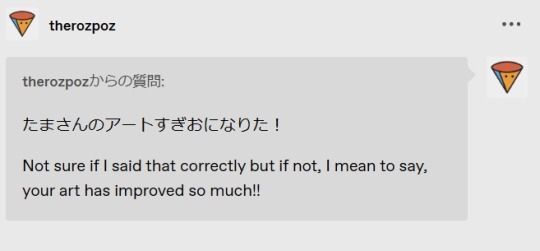
ありがとうございます! I am very happy and honoured to receive such a compliment! I've been studying painting in my sleep lately, so it's a great relief to know that I'm growing thanks to your message!
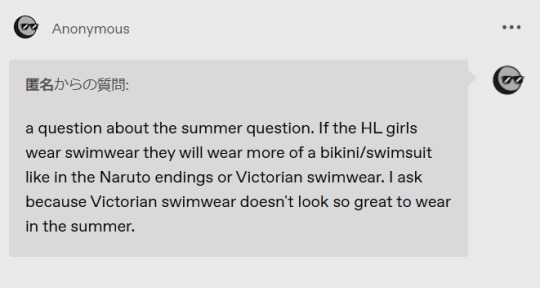
Personally, I think that the less revealing swimming costumes of the olden days are attractive, but as an artist, it is more fun to draw sexy swimwear, so I would like to draw HL Girls like in the ending of Naruto! 🤣 I'd like to draw about them next summer 🤭
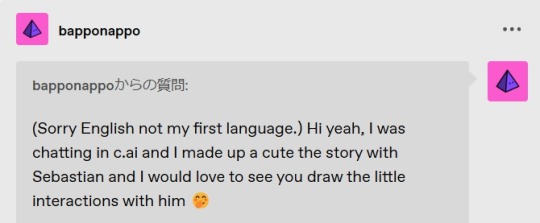
Thanks for showing me a great story! If I get a good idea to illustrate these in pictures, I'd like to draw them someday 🤭💕
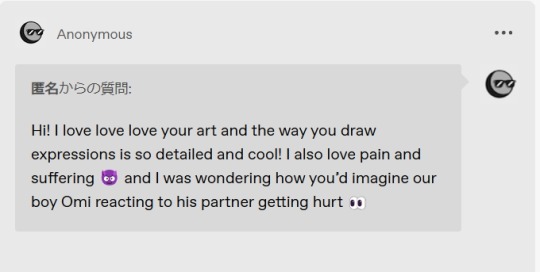
I am glad to hear such compliments! Thank you! And ahh, I would very much like to see Ominis in that situation!🥹✨✨ It must be fascinating to see him realising that his partner's unusual voice and breathing is causing them to be injured, and then impatiently trying to treat it as calmly as possible..! I hope to draw this soon 😏😏😏.
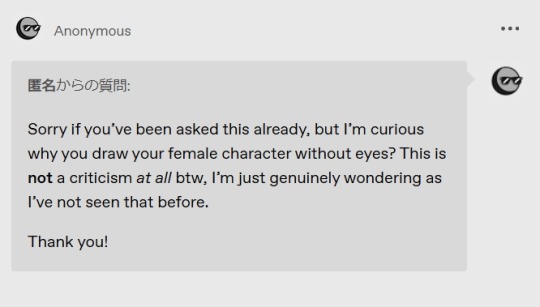
In Japan, when drawing a character x OC, we sometimes use a representation without their eyes to show that the OC is a character with no particular backstory or personality (or we sometimes represent the OC as a pure white mannequin, without drawing not only the eyes but also the hair and skin colour)😌 To be honest, I've been struggling for over a year and a half now to decide whether I should or should not draw eyes on personality-less OCs 🤣🤣
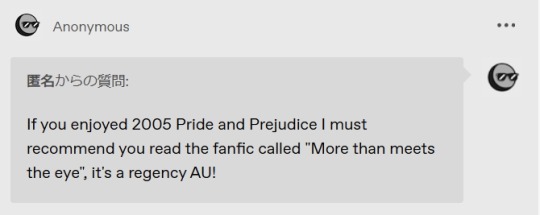
Oh, I've been recommended that fiction by various people and would love to read it, but you'll have to forgive me for not having read it yet 😭😭🙏. I'm especially sorry that lately I've been concentrating on my painting studies, cutting down on sleep and food, and I haven't been able to read at all not only the works recommended to me, but even those of my friends I follow: …… I will definitely read those works when I have the mental capacity to do so! 🙇♀️
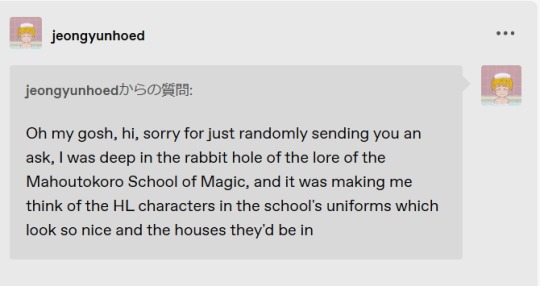
As a Japanese, I would like to draw the HL character in MahouTokoro uniform one day 🤭💪. I think it's supposed to be unclear if Mahoutokoro has dormitory groupings like Hogwarts, and from a Japanese point of view there are a lot of pretty weird things about Mahoutokoro and the Japanese wizarding world, but I enjoy fantasising about these… 😏💕

Of course! I love Japanese anime 😫😫💕. I especially love Naruto, I can't tell you how many fanart and fanfictions I've drawn over the past 20 years since I got into Naruto when I was 10 years old 🤣💕. Death Note and Crayon Shin-Chan are other Anime (Manga) that I've loved for years and years and have had a huge influence on me!
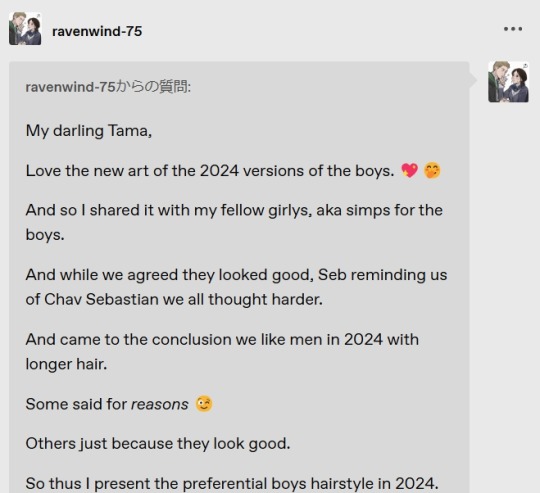
I am so glad you liked the 2024 Slytherins! I think I have discovered a new fascination for them by painting that picture! And I get dizzy just thinking about Slytherins with hair in the picture you sent me 😫🥵💕. They must definitely be cool with long hair too! Especially the long- hair Ominis, I've been wanting to draw him for a long time now🤭 I'll try to draw them with long hair one day 💪💪💪

In fact, just a year ago I drew about Seb like that, though maybe not quite the same 🤭 (https://www.tumblr.com/tamayula-hl/735330297365790720/the-boy-who-recognized-beyond-the-fourth) I like it a lot and your message makes me want to draw again about Seb and Omi who have realised the ‘truth’ 💪😏.
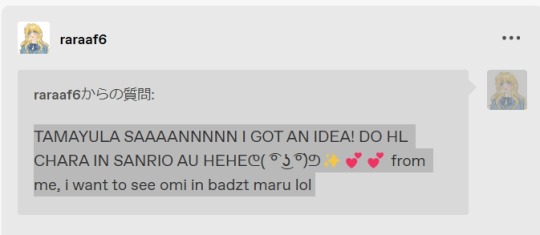
Raraa! The idea of collaborating Sanrio characters with HL characters was unexpected, but it would definitely be cute! ✨💕🤭 That cute but grumpy look of Badtz-Maru and Omi should be a good match… I want to doodle about them soon 🤣🤣

I'd like to draw it someday, and I'd also like to draw, for example, how Seb would look at Anne trying on a slightly sexier swimming costume… 😏😏😏

Perhaps you can find my work if you set it up as per the image below 😌
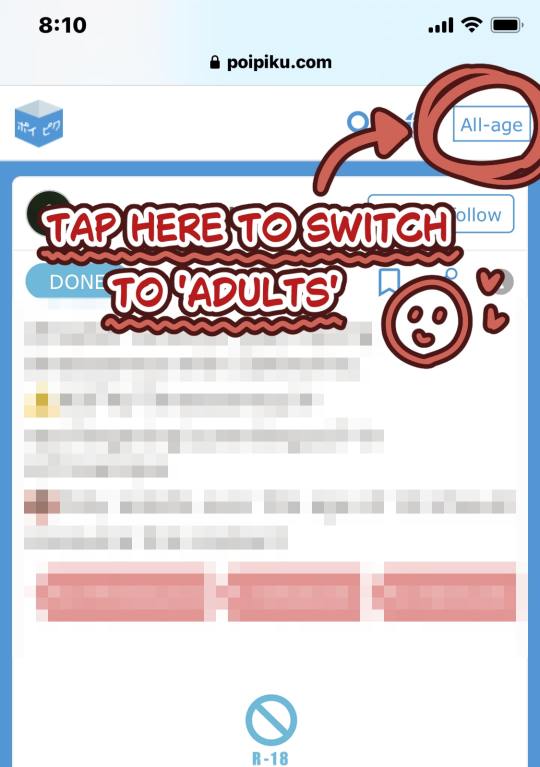
40 notes
·
View notes
Text
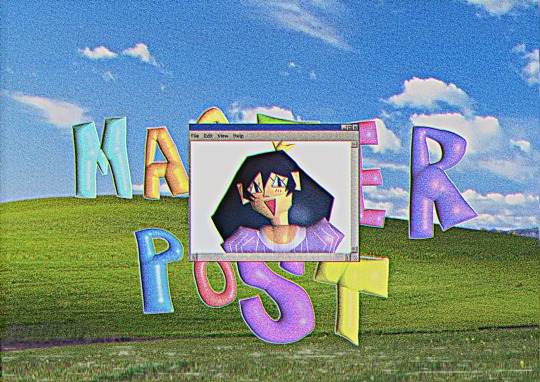
PUTER MASTERPOST AT LAST!!!
If you’re one of the people that asked me for this, the wait is over!!
To my pleasant surprise since I started it puter has become probably the most popular thing I’ve made which I’m SO grateful for… so, I thought it only fair to give the people what they ask for and make a full master post compiling all the content I’ve made for the au thus far!! This will be updated as I post, hopefully.
Keep in mind that puter is still a work in progress, so there will be a lot that doesn’t work or make sense yet, but trust me, I’m working on it! Remember, patience is key!!
So, without further ado, here it is!!!
Quick Summary
For anyone wondering what puter actually is, here’s the gist:
Following the events of OMORI’s neutral ending (specifically the one in which basil dies… specific variation of THAT isn’t too key at the moment but that might change for plot reasons…), five years after the move, with some help from his mother, sunny is improving… very slightly. In fact, he’s had enough motivation to pull together a shitty little flash game, fuelled by his past passion for them. He’s still not fully all there, and he still spends most of his time in headspace asleep, but now he has SOMETHING to work on outside of it, and it’s giving him the slightest reason and encouragement to wake up each morning. The slightest.
And, notably, one of the characters in said shitty flash game is actually based on Mari… Even when he isn’t really trying to, he ends up putting her in the game anyway, because he wants mari to be safe, and he’s so consumed by guilt and regret that he feels obliged to make her in worlds where she can be okay. Another sort of subconscious way of both immortalising her and apologising to her in another fun, perfect world of his design, where no harm can befall her, and everything is perfect. He didn’t kill her. They never argued. Mari is okay. Mari is fine, again. He’s sorry. He’s so, so sorry.
However… this stand in mari character actually gains sentience and becomes self aware, convincing itself that it truly is mari… leading to a LOT of stuff. We call her “mariware” over here, by the way!
The au’s actual storyline takes place years after this, following kel after he visits sunny’s mother five years after his mysterious suicide, and possessing a flash drive containing her son’s game… and, as we know, something else.
As stated like thirty times at this point… VERY work in progress!!! But I do have most of it figured out… though I’m not sure how to convey it as an actual story yet… but that will come with time, I’m sure!!!
Lore/ Canon Posts
Posts I’ve made for puter which are actual pieces I’ve put thought into and are canonical to the au. Have fun!!
ERHUSGKSCAE UEGGVXAE
SILBVRUW
IHX UEPJMCE
BUKLIEGV!
ULTAL QTMKE
UUG
Doodles/ Sketches
Here is where you can find all my non-canon doodles and sketches for the au!!
Concept art
Awful dithering test
Cleg gets the artstyle right for the first time
Click and drag
Antivirus
Club penguin
Kel design concept sketch
Microsoft paint
Mariware bromine brush 1
Mariware bromine brush 2
Mariware boingoingoingoing
Wrong
Fries
She wants to KILL
Heromari
Get a job bozo
Sir this is a Wendy’s
Teaser
IHX IVPJMKEL
…
…huh? Is something else meant to be here?…
…
…maybe it’s not ready yet.
#omori#omori au#omori mari#omori sunny#omori hero#omori basil#omori kel#omori aubrey#mariware#puter au#masterpost#if you spot any mistakes PLEASE let me know!!! thank you so much for all the support#genuinely I appreciate it all so much more than I can express <3#heromari#also. also secrets here#as you may have guessed if you’re a puter regular JEJSOSKSK#it’s a cipher I’ve used before so it’s hopefully easy enough to figure out!!! good luck!!!!
24 notes
·
View notes
Text
🪓 Hewn and Sewn 🪡
I’ve been thinking a lot about Háma’s death again lately and started this fic for Tolkien Horror Week. And then I both failed miserably on the timetable for that and realized that what I needed for myself was to find a way for his horrifying end (it’s there in the books, and it’s not pretty) to not be totally devoid of consolation. And so it maybe wasn’t right for a Horror Week event anyway. Your mileage may vary on whether you find anything remotely consoling in it. I just love my guy, my #1, and want him to be happy. I don’t know if this accomplishes what I want, but I tried.
CW: canonical character death. He met a brutal end, per Tolkien, and that’s here, along with a fair amount of battle/war reality, incl. some blood and guts and general violence/death.
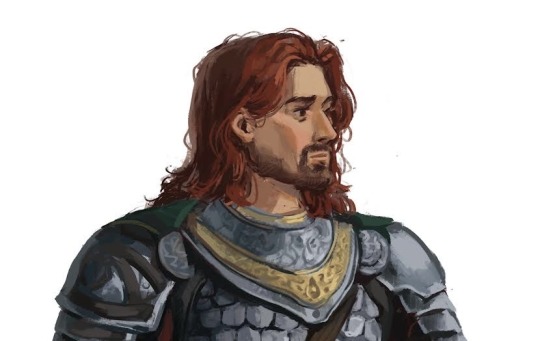
Art by @ rinthecap
**********
A body is surprisingly hard to kill.
The first thrust of a spear may bring a man to his knees, the second fills his mouth with blood, the third can barely be extracted again from the depths of his chest, but only the fourth brings mercy at last. Until then, the body clings to its life like a sailor adrift in an ocean storm, scrabbling after any tiny scrap of floating debris and clutching with bloodied nails and broken fingers to the last vestiges of a smashed and splintered ship that somehow hasn’t yet totally disappeared beneath the roiling waves. The body finds its greatest strength at the moment of its greatest vulnerability, stubbornly refusing to relinquish its desperate hold on survival and rallying to endure unimaginable suffering for just a little longer — one more boot to the skull, one more arrow through the gut, one more blade in the back, one more, and one more, and one more — to see whether the body’s will to live can outlast the enemy’s will to kill.
Háma knows all of this now.
He knows that the great tales of history have left out much of the truth, that the epic songs of invincible riders who slice through enemies like a scythe through wheat are more fantasy than fact. They have left out the hard work of dealing death, the sweaty, gruesome, arduous labor of cleaving into skin and muscle, hacking through sinew and bone, splitting open hearts and stomachs and lungs. They have left out the vomit and the blood and the entrails, the slippery gore that loosens grips and unsteadies footings, sending blows wide of their marks and into places that deliver pain rather than ending it. They have left out the soul-deadening horror of looking another man in the eye and realizing the only way to end his misery is to first give him more.
These realities are seldom spoken of, threatening as they are to the necessary project of war. New soldiers each discover them on their own, and Háma was no different. He came to the army while still hardly more than a boy, an idealist raised on stories of grand, heroic campaigns and aspiring to the honor of being one of the king’s own guards. None but his mother had tried to warn him of the cruelties he was sure to encounter, for she knew well the gentle heart that beat in her son’s chest. Always the first to smile, to extend a hand of welcome, to offer quiet encouragement, to assume the best even of those who had done him harm, she knew how such a heart would rebel against those inevitable cruelties. But he had so little experience of all that was vicious and foul in the world that he couldn’t truly comprehend the warning, no matter how carefully he listened, and in the end her bleak, abstract prudence was no match for the vivid potency of his dreams. He kissed her farewell and went off in trusting pursuit of all that was noble and righteous, blissfully innocent of the ugly truth behind the fantasy.
It took only one battle for him to realize that the valiant and glorious contests of poetry were neither valiant nor glorious but rather panicked, messy slogs where nothing was simple, nothing was clear and nothing was as he expected it to be. The shock of it nearly got him killed, frozen fast in horror amidst a raging squall of bristling spears and glinting blades and hearing nothing but the echo of his mother’s words, suddenly so palpable and so obvious. Only the panic and the mess and the general disorder saved him from meeting his fate before he was able to rouse himself at last to the grim necessity of action and do what was expected of him. He waded into the carnage, he added to it, he turned aside from suffering that he couldn’t relieve, he tried not to look at suffering that he had caused. And somehow, by the grace of Béma, he survived to see the victory, though the word itself now caught in his throat, devoid of meaning.
He cried after that battle, hiding alone in a darkened corner of a stable and wracked by huge, shaking sobs that both embarrassed and reassured him, proof that the day’s bloody brutality had exposed his naive ignorance but not taken his humanity. He wondered whether that humanity could endure even one more such pitiless trial or if it would break him, changing the very core of who he was. He wondered if he was already broken in ways that he couldn’t yet understand, ways that would be revealed to him only later in the long dark of a sleepless night or the cold grip of a relived memory. He wept for the man he had been and for the man he had wanted to be, someone who might now be a stranger to him forever.
He may have quit that very day had an older soldier not stumbled upon him and his tears, pulling him to his feet and tossing him a scrap of cloth to dry his face. We have all felt what you’re feeling, the soldier said. Anyone who is untroubled by taking lives should never be trusted with a sword. The soldier walked him over to a nearby field where neat rows of villagers were laid out to await burial — old men holding canes, young mothers in bright dresses, a few girls and boys with skinned knees or milk stains on their upper lips — all caught unaware by the enemy before the forces of Rohan had arrived to drive them back. Remember that you have killed so that people like this might live, the soldier said, and he left Háma to keep watch among the corpses, to contemplate death anew.
It seemed a simple reminder, a basic truth so obvious that it need not be spoken, and yet he had needed to hear it all the same. To be a guardian, using his strength and abilities to protect others, had been his earliest aspiration, and now perhaps that dream could protect his own heart as well, offering him the sense of purpose that would help to make the suffering feel worthwhile. He walked slowly from the silent field and back into the center of the village, where water was being drawn, animals fed, children minded, lives lived despite the tragedy to befall them. He rejoined his éored with a brief nod to the older soldier, and when they rode out again, he did so with the rent in his heart not healed but at least knit loosely together again, mended with stitches of duty and honor.
*****
Since that day he has killed many times, never unprovoked or with wanton disregard and never with the overpowering horror of that first battle, but also never with the clean, simple ease that he had once been led to expect. Each time he is forced to inflict pain on another, he feels it in his own limbs, and though he hates no man, he comes closest in his despair over those who fight him the hardest, who persist through blow after weary blow and refuse to yield or retreat. Do not force me to do this to you, his mind pleads silently, and sometimes, though it means the same thing, do not force me to do this to myself. In direst conditions, compelled to keep defending himself from an opponent with the white glimmer of bone shining out from mangled red flesh or with a dark, empty space where an eye had just been, he cannot keep these thoughts contained to his own head. Barely audible amidst the clash of metal and the thunder of hoofbeats and the groaning of the injured and maimed, he speaks the words aloud. I am sorry.
Many of these men linger in his memories, images of them emerging suddenly and unbidden from the depths of his mind while in the middle of doing other, more benign things. The man who stared up at him from a puddle of gore, tears streaming from eyes that were the same pale green as those of Háma’s youngest sister. The grievously wounded man who had spit in Háma’s face when offered mercy before plunging a knife into his own throat. The man who whimpered one word over and over as they grappled for control, a word Háma later learned meant ‘please’ in the tongue of the Easterlings. These memories tear at the stitches in his heart, testing their strength and threatening to sunder him anew.
One man in particular haunts his thoughts, lurking always in the shadows of his waking mind or the hazy, fragmented mirages of his dreams. Part of a company of Dunlendings who crossed the Adorn without leave, this man was a talented warrior, and had he only been taller or slightly larger of frame things might have ended differently. As it was, it took three heavy strokes of Háma’s sword to bring him down, and the battle-notched edge of Háma’s blade caught on something as he sought to pull back the final stroke. Forced to lean in close, to brace his foot by the dying man’s chest as he struggled to free his weapon from whatever barbed hook of metal or bone had trapped it, he found something he did not expect on the haggard, shivering face that was now only inches from his own — a smile, small but clear, and growing only wider as the man pulled in his last rasping breaths and the light slowly dimmed from his eyes.
The memory of that smile never truly leaves Háma. It follows him everywhere, as attached to his mind as his shadow is to his feet. He sees it when he stands long, lonely hours on watch in the cold and when he sits in a crowded tavern that swelters with the heat of a hundred bodies pressed side by side. It creeps up on him in the quiet wandering of his thoughts while his hands perform some common, repetitive task, or it appears with startling suddenness in the middle of pressing matters, insisting on claiming a share of his focus with the urgency of its unknowable mystery.
He dreams up a thousand different reasons why a man would smile through such agony, somehow finding happiness in the moment of ultimate despair. Perhaps the man hated his life and was glad to be rid of it at last, or he felt honor and pride in the idea of dying for his cause, though that cause was repugnant to Háma himself. Perhaps the smile was brought on by a delusion or hallucination, a vision of pleasure or comfort that shimmered with false loveliness for that Dunlending’s eyes alone. Perhaps it wasn’t even a smile but rather a spasm or tic, an arbitrary contortion of muscles masquerading as a familiar emotion and torturing Háma now with a futile search for meaning in the utterly meaningless. The only man to know the answer has taken it to his hastily dug grave.
Háma lives these years balanced on the knife’s edge between revulsion and understanding, doubt and certainty, heart and gut. But with each battle, he learns better how to fight in a way that feels true to himself, anchored to his decency, and he learns better how to strengthen the parts of him that quail at the task, reinforcing those weak spots so that they prove all the harder to wound a second time. He patches himself with reminders of all that he fights for, and, in time, life gives him more and more to add to that armor. A beautiful wife who brings warmth and light into all of his days. A daughter who owns him, body and soul, from her first breath. Hard won respect and admiration, first from his commanders, then from the men entrusted to him, and finally from his king. He will never be a battle-hardened veteran, numb to the business of death, but he finds his way forward, refusing to let the sharp edges of those old memories and doubts carve and pare his spirit until it is shorn of all that is hopeful and joyous. Instead, he embraces the business of life, of being a husband, a father, a son, a brother, a friend, a King’s Guard, a captain, a doorward, all of his selves linked together like the rings of his mail and bringing him just as much strength. He is happy, and he is whole.
*****
And so it is that he finds himself strangely at peace on the ride to what will prove his last battle. He has spent a lifetime preparing himself for this moment, this challenge, and he will meet it with honor. The hand of fate has landed on Helm’s Deep, an unexpected turn but one that he welcomes. He knows this place, its gate, walls and keep, unbreached by any outsider in all the long years of history. A fortress and a refuge at once, it is everything that he holds himself to be: strength and shelter, protection and not aggression. If the Rohirrim are forced to this step, with the point of a sword at their backs, there is nowhere else he’d rather make their stand, defending the inviolable.
They have been warned that this fight will be unlike any other in the lifetimes of this army. This is no skirmish over the placement of a border, no periodic flare-up of ancient, simmering tensions. This is existential, a contest that will decide whether Rohan endures a little longer or falls entirely, and among their old enemies of Dunland there will be new enemies as well, orcs of Isengard that are taller, stronger, unafraid of the sun, more desirous of blood. They drink in the joy of death like a cat laps up cream, he is told. Show them no mercy, for none will be shown to you. He sees the logic of this advice even as he has no plans to follow it. He has worked too hard to keep the cruelty of the world from making him cruel in turn. He will do what must be done, but he will do it as himself, from goodness, and not in imitation of those he deems wicked.
Final commands are given. Théoden sends him to hold the gate, and though he feels ill at ease to leave the king, his one and only charge, he knows it is the greater need and he goes willingly. The ragtag assortment of defenders at the gate are his charge now — cavalry riders preparing to fight from foot, farmers of the Westfold, teenage boys whose beardless faces catch the moonlight — and he assures them that it is alright to be afraid. They will face the fear together. He feels some of that fear himself, more aware than ever of his captain’s uniform that will distinguish him among the masses, drawing attention in the one place where such attention is least welcome. But he would sooner die in this symbol of all he believes in and all he has worked for than to hide in common disguise. His uniform clothes him in courage.
The fighting itself, once it begins, passes quickly, as do most things that overwhelm. There is scarcely a second to take in what is happening before it’s happened, and things grow only more chaotic as the late night stretches into earliest morning. Fear keeps him moving, because to give in to the exhaustion, to stop for even half a second of stolen rest, is to expose yourself to the heavy stroke of an axe or a sword or a pike or any of the other tools Isengard has devised to sever the loose connections that hold a man’s body together. Fear keeps him on his feet, and courage keeps him pressing forward, unwilling to give ground toward that precious gate.
He fights this battle his way. He leaves those enemies who are injured beyond the point of threat to be collected by their countrymen. He dispatches mercy to those whose injuries have already guaranteed death, bringing an early end to their suffering. He takes no action from anger, only necessity. He kills, many times over, but always as a last resort and each time with a heavy heart, for even the orcs are living creatures, once descended from elves if old tales are true.
He is not unscathed in the struggle. Bloody weals, red and shining, cut across his cheek and throat, and his left arm hangs dead now at his side, the muscles needed to raise it severed by the point of a spear. But he is undaunted and rallies, again and again, as men and boys, soldiers and herders, guards and merchants, fathers and sons, fall all around him to the seemingly endless waves of new opponents. His luck holds, until suddenly it doesn’t.
The first sharp blow slides neatly into the narrow band of exposed leather near his shoulder, where a piece of his armor has been forcibly pried from his body. It slices cleanly through the layers of hide and cloth, cleanly between ribs, cleanly into the center of him. It stops him in his tracks, not from the pain, which is strangely delayed, but from the abrupt sensation that all the air has gone from his lungs, which leak uselessly now into the hollow of his chest. He is still standing, struggling to pull in delicate half breaths that each slice like a blade of their own, when the second blow lands, a sword at the knee that sends him to the ground. The third, a heavy, percussive jolt from a bludgeon, shivers the bones that don’t shatter outright and leaves him sunk helplessly in the muddy grass, surrounded by a pool of blood that started out as someone else’s but is soon more his than not.
A burst of flame to his left draws attention away as both sides rush toward the noise and light, and he is left for a moment on his own. Above him hangs the black, blank sky, the stars now blocked by clouds and haze and smoke. Beside him are an elderly man with no helmet and a split skull, eyes fixed open in unseeing horror, and a teenage boy, face gone grey and breathing shallow as the contents of his veins empty steadily from a gaping hole in his side. Háma would comfort him, take his hand and bid him a swift journey to the halls of his forebears, if he could only lift an arm or force a word from his lips. But there is no strength in that arm and no air to carry the sound. He manages only to inch his hand next to the fading warmth of the boy’s fingers, and he hopes the boy will feel it and know that he is there, that they are not alone. It isn’t enough, but it will have to be.
A burning pressure builds in his chest, pushing out against his broken ribs and mangled muscles with a force that could tear apart whatever is left of him that is still intact, and somehow, above the screaming and the thunder and the clang of weaponry, he can hear a wet, bubbling sound each time he tries to inhale, as though he is drawing breath through a sopping cloth. He wonders if he might drown, miles from any river or lake or tide except his own blood that is rising in his lungs, and he uses his last gasp of energy to weakly raise his head, eyes searching desperately for a friendly face that might be able to drag him to help. But the eyes that meet his are instead cold and cutting, and they sparkle with sharp malice when they recognize the fine armor and burnished insignia of the captain of the King’s Guard.
A voice calls in a tongue that Háma cannot understand, but he needs no translator to know its meaning or that of the answering calls. Fingers are pointed in his direction. Grips are tightened around axes and knives and clubs. Lips curl into wicked smirks as many feet advance toward him, the defenseless prey whose brutal end will send a message to no less than the king of Rohan himself. No mercy will be shown to you.
The crushing realization hits him in an instant, though perhaps he should have known it all along. This is the end. There aren’t enough allies left standing to save him, even if his wounds could be healed. The gate, the one object of his focus, is being torn now from its hinges, riven with deep fractures and fissures, and these men and orcs will pour through the gaping rupture just as soon as they are done with him. It will matter to none of them that he is as good as gone already, slowly choking to death on his own bile and blood, because they mean not just to kill but to destroy. They mean not to leave him in one piece, not to keep him recognizable even to those who love him best. They will take his life, but they will also take his identity, his dignity, his grace, his chance to be mourned over by those who would hold him, stroke his hair, kiss his brow, touch his cheek.
He turns his head again to the young man at his side, to see one last Rohirrim face, but it has gone stony and lifeless, an unmoving mask of arrested youth. Háma studies this face, the soft down of a first beard, the skin unmarred by old scars or new wrinkles, and his heart trembles at the thought of all that this boy never got to do or have. A whole lifetime that was yet to be lived, with loves to be found, achievements to be celebrated, misfortunes to be endured, contentment to be earned. His death is a tragedy of lost hopes, of all that might have been had the boy been given even the twenty extra years that Háma himself has had. And that is the thought that brings a sudden and utter calm to Háma’s spirit, quietly reassuring despite the looming specter of gruesome execution treading closer and closer each second.
He cannot see his own imminent death as a tragedy like this boy’s, for Háma has lived — not as long as many men, but fully and well. He has loved and been loved. He has made himself and others proud. He has laughed and cried and grinned and gasped. He has seen great beauty, heard words of great kindness, tasted much that was sweet, felt hands of true tenderness. He has served a land he reveres, one that he knows in his heart will prevail and find a way off its knees to stand tall once again. He has joined himself to people worth dying for, people that he would weep to leave if not for the knowledge that he was more fortunate than most to have ever had such people in his life, no matter how briefly. A wife who was the love that made all the others irrelevant. A daughter who was every bit as perfect as she adoringly believed him to be. Another baby that would arrive in four months’ time and bring consolation and joy to its mother when she’d need it most. They will be pained to lose him, but he trusts their strength, the kind that isn’t sharp and brittle like iron but binds and flexes like thread.
Amid all the suffering of the world, he has been blessed, his fate woven together so tightly with filaments of gladness and fulfillment and favor that those things can never be sundered from him, even now at the very end. When the first axemen crowd around him at last, he doesn’t feel fear or hatred or regret. He feels only gratitude for all that he’s been given. When an enemy first takes his leg at mid-thigh and then his arm at the elbow, he isn’t thinking of the pain. He is thinking only of how one man could be so lucky, how he had somehow managed to claim not only his share of good in the world but many times that much. When a blade takes his ear and iron-toed boots prod where his ribs no longer provide resistance, he hears Brytta’s sweet voice calling his name and feels Hálwinë’s soft cheek rested against his chest. And when the last rattling breath leaves his battered lungs, sighing softly from his bloodied lips, he looks right at the man above him and smiles.
#háma#my beloved#kind of dark and definitely has some blood and guts#which seems appropriate to the mood lately#but i swear i tried to find the uplift#he’s my number 1 favorite guy#and i just think he’s neat#lotr#rohirrim
23 notes
·
View notes
Note
I don’t know about anyone else, but I think a lot of cis straight women who write mlm typically write mlm because it’s nice to write a love story with out the inherent power inbalance that all straight relationships have.
YES !!! 100% yes, this is a point i make in this video !!!
i mean,,, i'm coming at it from a different perspective as someone who read only mlm prior to coming out as trans, but it's the same concept - wanting to disconnect from your own identity and fall head over heels into something else.
it's nice to read stories where your inferiority isn't part of it, where you aren't subjected to patriarchial values or situations, and you can just,,, enjoy the story, you know? and i think mlm ships, more so than wlw ships, provide that escapism more.
i think i also talk a bit in that video about mainstream media and the effects that has, especially in a fandom space. marauders for example, the core four are men and the people they are connected to *canonically* are mostly men - we know more about them and how they navigate the world, and that makes for more interesting stories. (see here: "but regulus has barely any cano-" he does but also,,, he's the brother of a core character, hence why he's developed a lot)
we can also get messy with the men, you know? we see it a lot in mainstream media *and* fandom where a "messy" woman (a human being with flaws and mistakes) is criticised for being misogynistic etc etc, and we lose complexity through that (i'm looking at you, platonic snily deniers /hj but fr, that is the most central part of her character imo)
but marlene and dorcas for example? we only know about two facts, including how they died, and we don't even know if they were in the same year as the marauders, so it's more of a gradual development than taking developed male characters - mainstream media sucks man :/ god forbid we get developed women.
so yes !!! i stronglyyy dislike the fetishisation argument because whilst there is 100% the chance that that is why people write and engage in those stories, 99.9% of the time it isn't and people either (1) like that escapism that comes from reading without your inferiority as a woman coming into play (2) like reading more complex stories that we typically get with men, especially since we allow them to get more "messy" and (3) they just,,, like the characters.
there's a big gap between the consumption of mlm media and the consumption of wlw, but i don't think demonising mlm and reducing it to just sexual fantasies and fetish desires is progressive at all,,, less so even.
#asks#omg sorry you did NOT order a yap#i truly can't shut up#none of this is to say we cantttt have complex wlw stories that address that gap#(psst - femininomenon fest <3)#but that there are reasons other than fetishisation as to why people - specifically cis straight women - will lean towards mlm
20 notes
·
View notes
Text
agreed 100%. i see most people depict human gamzee as Black, and to me it feels like a superficial read of the character at best. and more than a bit uncomfortable tbh, considering the fact that gamzee's character is... a violent drug-addict with a deadbeat dad. i don't know whether or not hussie was being intentionally racist when they initially wrote gamzee, but either way, i'm not interested in participating in it. i don't think gamzee being Black adds to his character at all, i think it just reduces him to a racist caricature, and in a world where i can choose how i imagine these characters, i can think of more interesting stories to tell with him.
for example, how a lot of bigoted and abusive white boys can fly under the radar because they're a "chill dude" and people dismiss their red flags as endearing ignorance, and their appropriation as appreciation or whatever. until something sets them off, or you let your guard down, and now suddenly you don't know them at all. listen, i grew up in utah surrounded by conservative religious people. idk about other highly religious groups, but mormons work very hard to keep up appearances of being polite and welcoming to everyone, and keeping their bigotry quiet. but once it finally shows its face, it's like they become a completely different person. i've lost countless friends by finding out years into the friendship that i don't actually know them at all, and that they secretly wished me or my friends ill, or thought our existence was inherently wrong. that's what gamzee is to me, that's what makes him scary. maybe the signs were there, but you didn't see them because he was a highblood who was nice to you, so you assumed he was harmless, and he wasn't.
tbh the whitest trolls to me are the zahhaks and the makaras bc of what kind of internet-people equius and gamzee represented at the time. juggalo culture is predominantly white working class folks or white folks on the poverty line, and in the US bc of segregation, that meant a lot more mixing of cultures than you see in middle class and up areas. its the same with canada and the UK. so you see a lotta black influences in there bc of how US class structures have been constructed. its a melting pot made by and for the working class. a lotta irl juggalo stuff is pretty chill from what ive heard? as a movement they want to demolish class heirarchy and build community. ofc theres room for abuse in the lifestyle though, thats not unique to juggalos. gamzee as a rich white boy living a juggalo lifestyle but not getting it right and actually reinforcing what irl juggalos fight against makes perfect sense for his character
equius on the other hand is like belligerently Hegemonic White Cis Dude coded to me. he represents young white cis boys on the precipice of falling into the manosphere pipeline, imo. specifically bc theyre lonely and insecure. his spot on the hemospectrum is perfect for breeding that shit. he's been told his whole life that hes better than most of the ppl he knows. hes higher up caste wise than most of his friends, particularly nepeta, but still feels inferieor to his friends who ARE higher up than he is, which is what sparks that hyperspecfic brand of insecurity in white cis boys. their only real problem is that someone else whos even more priviledged is looking down on them. and gamzee also being white just kind of compounds that bc of the sense of 'competition' between white guys or whatever, to be The Whitest Squarest* Guy who is On Top (haha) Of All Other White Square Guys
everyone else? nah. its so obviously not whats happening. which really just highlights the fact that large swaths of fandom still believe that white is default in terms of character design. and its insane to me how ppl can say w/ their whole chest that the hemospectrum has nothing to do w/ race, its just abt class, when racism and class are intrinsically tied. like theyre horrible twin sisters, man, you cant rlly have one without the other. enforced class models in society dont work unless theres someone up top deeping someone else Deserving of having less bc theyre not the exact same type of person as them
*using the term Square here not to denote any kind of 80s movie nerddom but to try to describe normies who are toxic abt it and think everyone else should be like them
#im not trying to start shit with anybody who imagines gamzee as Black#do whatever you want#i just personally think he makes more sense and is more interesting as a white character bc of what he represents in the story#and there are plenty of other trolls who work great as Black characters#i also see eridan as white but if someone has a different argument i'd love to hear it#nephistuck#mormonstuck#<- sorta? mormons mentioned so im counting it
127 notes
·
View notes
Text
I think that the 2010's media landscape of Buzzfeed articles about plotholes in disney movies, Cinemasins critiques, and Watchmojo Top Ten scenes in movies that make no sense has truely ruined a lot of media. People are afraid that their work will be torn down if they dare leave a single thing up in the air, if they dare ask their audience to suspend their disbelief.
All too often nowadays I see stories (especially fantasy), take the time to explain how every small aspect of the world works and how it all logically makes sense. The constant time stopped to explain why an event happened, how this object works, or why this is important to the characters. It's just really not needed and it honestly makes a lot of stories worse.
I am of the opinion that the best stories truly just drop you into their world and explain nothing. They just take you through the story of this world and you just have to accept it and continue on. "When he became king, the land became barren." I don't want the story to stop and explain why this is, or how it happened, I want us to move on so we can just assume that the king has such rancid vibes that everything died.
#simon says#i watched the Last Unicorn again recently and it fucking slaps#and I noticed a huge part of why it slapped is because it doesn't explain shit#same with a lot of other fantasy things from the 70's and 80's I've noticed#and even older stories all the way back to fairy tales and fables#they just tell you something and move on#and it works!#a lot of the time it feels far too hand-holdy or immersion breaking for the characters to stop and explain something for the audience#like these characters would not take the time to explain the aspects of their world in detail to other people who live in this world#this is clearly for the audience only and so that they can feel more satisfied with an answer#but it fucking sucks!!#it is bad writing!!#to presume your audience has no suspension of disbelief so you stop everything to explain how the world works for them alone is bad!#it makes the story feel awkward because it feels out of character for the people of the world to talk like that and it feels insulting tbh#like you really think the audience's ability to pick up details of the world from dialog and onscreen (or page) information is that poor??#and to some extent it is#lord knows we are having a serious media literacy and general literacy issue in the United States#but it's honestly just bad writing and it bugs me so much. my number 1 pet peeve in fantasy is overexplaining especially when it doesn't fit#like just fucking tell me that there's a magical world on the other side of this wall in a village and move on#i can just accept this fact#imagine if the Dark Crystal took the time to explain every aspect of the world#that movie is already jam packed with random story and world bits that you just have to accept and move on from#now imagine if they took a solid 2 minutes to explain what the fuck Fizzgig is.#i think leaving it at 'he's a friendly monster and Kira's friend!' is the perfect place to leave it at#we do not need a full explanation on Fizzgig's species and behavior and why he's friendly unlike other monsters#he's a friendly monster and he's Kira's friend! that's all we need to know! we got a dark crystal to put back together!!!
24 notes
·
View notes
Text
ive just rediscovered an old wip of mine and im having so much fun right now. like i havent opened the document since early 2020 and genuinely forgot it existed yet there's 90k words and so much lore and elements of basic concepts that made it to my present writing in far cooler and more complex ways and the writing isn't great but there's potential to it and idk. it's been a while since i wrote something privately and while i hugely prefer the way i do it now where i actually have a community with it and dont hole myself away and act like it's a huge shame thing, there's still something hugely reasuring about knowing this is something ive always done and that actually i was always drawn to it and had potential and that's something to remember for when my writing block gets bad or i convince myself Everything Ive Ever Done Is Awful
#like this story is one where if i tackled it with my writing abilities now it would genuinely be really good#that's how sound the basic premise is. and i have SO many wips like that with tens of thousands of words to them#and i was doing this for ZERO reward ZERO attention i wouldnt tell a SOUL not even my family#i truly just have always loved and NEEDED to write. that is such a cool thing to be able to say#anyway yeah this wip lowkey fucks. like there's lots of aspects to it that are cringe and telling of the fact i was writing it at age 16#but the fact i came up with something so fleshed out at SIXTEEN??? insane#and this isnt even one of my big older wips. i have three that immediately come to mind that were sooo much bigger than this#like on the shorter end being 100k words and larger end easily being near 300k words#and they were JUST FOR ME like i didnt even know what ao3 WAS and i never spoke to anyone about my writing#and they WERENT FANDOM BASED. i was just casually coming up with super original detailed and COMEPLLING worlds#and characters and plots with complex twists and tropes and i was just doing it for shits#that's so fucking cool. did you ever think you'd see the day i gave past hella a pat on the back bc i didn't
34 notes
·
View notes
Text
I'll never be over the fact that being batman it GYAHHHH! so when bruce becomes batman and makes his vow to get justice for gotham, to make it so that no one else has to experience the devastation and loss he did the night he lost his parents- being batman means well his job, his mission requires overexposure to death crime and tragedy in order for him to prevent it, and like yeah he never truly ever left crime alley, but that wound is constantly being ripped open. Every person, every ally, every one of HIS KIDS especially that he loses in pursuit of this mission makes the injury new and fresh and red.
this isn't news of course but everytime it hits me that because batman is built on grief he's destined to do it forever I just ☹️☹️
#had the very unoriginal experience of listening to i bet on losing dogs while thinking abt batman and his kids#bruce you are the embodiment of that quote abt not loving wisely#batman#bruce wayne#thought bubbles#the haunted house#batman is such an old concept such an old idea#hes been doing this going through this for so long and not stopping anytime soon#batman functions the same way gods do in a lot of media where as above so below like the people and what they believe shape the entity#dc comics can do whatever they want change in any possible way they can make his character unrecognizable#it doesn't change the fact that when bruce is eight years old he watchs his parents get shot in an alley way and Something Else is born#bcs thats the story everyone literally almost everybody in the world knows one way or another#and thats the way batman will always exist in the global consciousness#haaaa#dc comics
20 notes
·
View notes